Publications
When there are new challenges to rise up to, KAIST CAF will be at the very forefront.
Publications
Total : 59
-
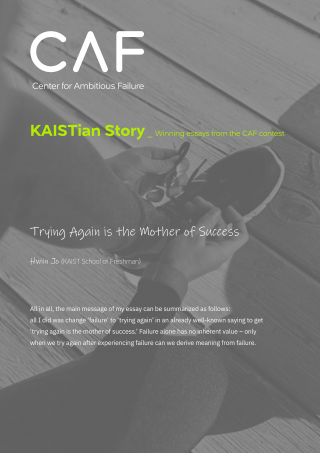 KAISTian Story(KAISTian Story) Trying Again is the Mother of Success
KAISTian Story(KAISTian Story) Trying Again is the Mother of Success2022-09-26
Hwiin Jo (KAIST School of Freshman)
Winning essays from the CAF contest "My Failure Story" Hwiin Jo (KAIST School of Freshman) All in all, the main message of my essay can be summarized as follows: all I did was change ‘failure’ to ‘trying again’ in an already well-known saying to get ‘trying again is the mother of success.’ Failure alone has no inherent value – only when we try again after experiencing failure can we derive meaning from fa
Origin
Download -
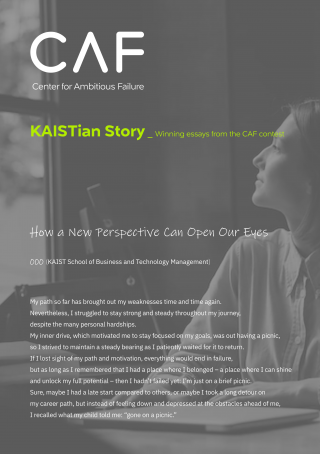 KAISTian Story(KAISTian Story) How a New Perspective Can Open Our Eyes
KAISTian Story(KAISTian Story) How a New Perspective Can Open Our Eyes2022-09-26
000 (KAIST School of Business and Technology Management)
Winning essays from the CAF contest "My Failure Story" 000 (KAIST School of Business and Technology Management) My path so far has brought out my weaknesses time and time again. Nevertheless, I struggled to stay strong and steady throughout my journey, despite the many personal hardships. My inner drive, which motivated me to stay focused on my goals, was out having a picnic, so I strived to maintain a steady bearing as I patiently waited for it to return. If I lost sight of my path and motivation, everything would end in failure, but as long as I remembered that I had a place where I belonged – a place where I can shine and unlock my full potential – then I hadn’t failed yet: I’m just on a brief picnic. Sure, maybe I had a late start compared to others, or maybe I took a long detour on my career path, but instead of feeling down and depressed at the obstacles ahead of me, I recalled what my child told me: “gone on a picnic.”
Origin
Download -
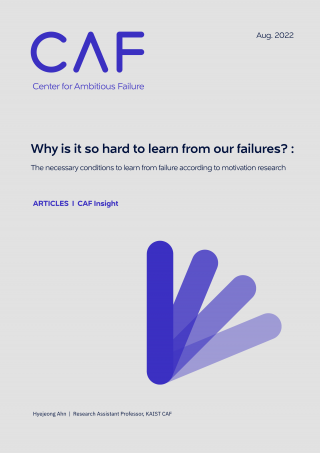 CAF InsightWhy is it so hard to learn from our failures?
CAF InsightWhy is it so hard to learn from our failures?2022-08-18
Hyejeong Ahn
Why is it so hard to learn from our failures? : The necessary conditions to learn from failure according to motivation research Today’s society is well aware of the fact that there are ‘lessons to be learned from failure.’ We often see successful individuals emphasize the importance of learn- ing from one’s failures. For example, Microsoft co-founder Bill Gates once said, “ it’s fine to celebrate success, but it is more important to heed the lessons of failure.” But let us take the time to think about this statement: how much do we really learn from our failures? The research paper featured in this report was published in 2019 by Professor Ayelet Fishbach from the University of Chicago Booth School of Business and Dr. Lauren Eskreis-Winkler, and it challenges our conventional wisdom of ‘learning from failure.’ Here, an experimental study was conducted to prove how the act of failure itself prevents an individual from focusing on the lessons that can be learned. This report will share and examine some of the key findings and implica- tions of the study.
Origin
Download -
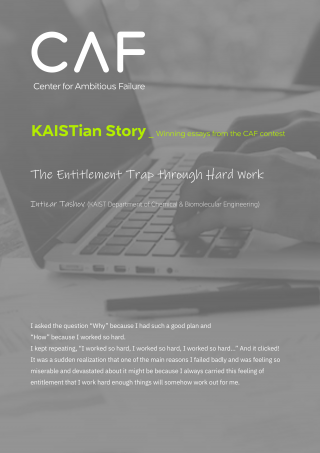 KAISTian Story(KAISTian Story) The Entitlement Trap through Hard Work
KAISTian Story(KAISTian Story) The Entitlement Trap through Hard Work2022-08-18
Intizar Tashov (KAIST Department of Chemical & Biomolecular Engineering)
Winning essays from the CAF contest "My Failure Story" Intizar Tashov (KAIST Department of Chemical & Biomolecular Engineering) "I asked the question “Why” because I had such a good plan and “How” because I worked so hard. I kept repeating, “I worked so hard, I worked so hard, I worked so hard…” And it clicked! It was a sudden realization that one of the main reasons I failed badly and was feeling so miserable and devastated about it might be because I always carried this feeling of entitlement that I work hard enough things will somehow work out for me."
Origin
Download -
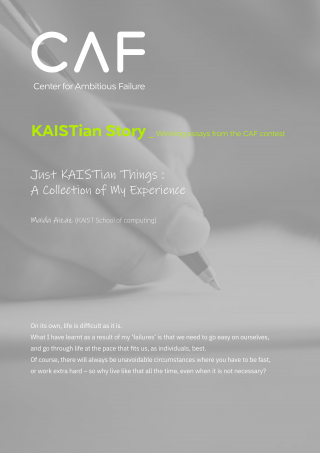 KAISTian Story(KAISTian Story) Just KAISTian Things : A Collection of My Experience
KAISTian Story(KAISTian Story) Just KAISTian Things : A Collection of My Experience2022-08-18
Maida Aizaz (KAIST School of computing)
Winning essays from the CAF contest "My Failure Story" Maida Aizaz (KAIST School of computing) "On its own, life is difficult as it is. What I have learnt as a result of my ‘failures’ is that we need to go easy on ourselves, and go through life at the pace that fits us, as individuals, best. Of course, there will always be unavoidable circumstances where you have to be fast, or work extra hard – so why live like that all the time, even when it is not necessary?"
Origin
Download -
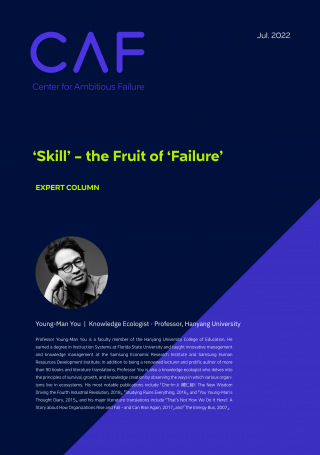 Expert Column‘Skill’ - the Fruit of ‘Failure’
Expert Column‘Skill’ - the Fruit of ‘Failure’2022-07-21
Young-Man You
<contents> - Failure drives us to find links, which can give birth to unexpected imagination. - A crumpled paper plane flies the furthest. - We need to fall over to be able to see other opportunities. - You can’t write a poem if you don’t start. - Great achievements do not appear out of thin air. Young-Man You | Knowledge Ecologist · Professor, Hanyang University Professor Young-Man You is a faculty member of the Hanyang University College of Education. He earned a degree in Instruction Systems at Florida State University and taught innovative management and knowledge management at the Samsung Economic Research Institute and Samsung Human Resources Development Institute. In addition to being a renowned lecturer and prolific author of more than 90 books and literature translations, Professor You is also a knowledge ecologist who delves into the principles of survival, growth, and knowledge creation by observing the ways in which various organ- isms live in ecosystems. His most notable publications include 「Che-In-Ji (體仁智): The New Wisdom Driving the Fourth Industrial Revolution, 2018」, 「Studying Ruins Everything, 2016」, and 「You Young-Man’s Thought Diary, 2015」, and his major literature translations include 「That’s Not How We Do It Here!: A Story about How Organizations Rise and Fall – and Can Rise Again, 2017」 and 「The Energy Bus, 2007」.
Origin
Download -
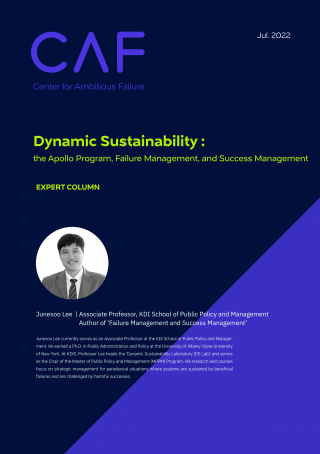 Expert ColumnDynamic Sustainability : the Apollo Program, Failure Management, and Success Management
Expert ColumnDynamic Sustainability : the Apollo Program, Failure Management, and Success Management2022-07-21
Junesoo Lee
"Contrary to how the term ‘sustainability’ has calm and static connotations, the process of achieving sustainability is highly dynamic. This is because the environment and reality around us are constantly changing. This gives rise to two paradoxes: failure can be beneficial, while success can be harmful. Ultimately, failure management is about managing the ‘benefits of failure’ and success management is about managing the ‘harms of success.’ More importantly, we must remember to pursue both failure management and success management if we are to surpass static sustain- ability and achieve dynamic sustainability." Junesoo Lee | Associate Professor, KDI School of Public Policy and Management Author of ‘Failure Management and Success Management’ Junesoo Lee currently serves as an Associate Professor at the KDI School of Public Policy and Manage- ment. He earned a Ph.D. in Public Administration and Policy at the University of Albany-State University of New York. At KDIS, Professor Lee heads the ‘Dynamic Sustainability Laboratory (DS Lab)’ and serves as the Chair of the Master of Public Policy and Management (MPPM) Program. His research and courses focus on strategic management for paradoxical situations where systems are sustained by beneficial failures and are challenged by harmful successes.
Origin
Download -
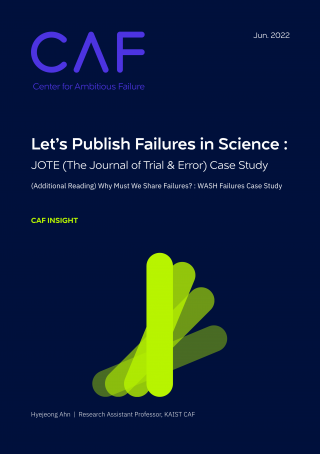 CAF InsightLet’s Publish Failures in Science : JOTE (The Journal of Trial & Error) Case Study
CAF InsightLet’s Publish Failures in Science : JOTE (The Journal of Trial & Error) Case Study2022-06-23
Hyejeong Ahn
Let’s Publish Failures in Science : JOTE (The Journal of Trial & Error) Case Study There is an academic journal that lives by the motto of ‘let’s publish failures in science.’ We are talking about the peer-reviewed open access journal based in the Netherlands called the Journal of Trial & Error (JOTE). This project is centered around the belief that ‘the way science is communicated affects the way science is done’ and is run by graduate students (master’s and doctoral degree candidates) studying in various fields, including history, neuroscience, philosophy, physics, artificial intelligence, toxicology, and more. This month’s issue of CAF Insight will explore the background behind the birth of JOTE, the journal’s purpose, and the activities pursued by the JOTE team. We will also discuss the implications of their efforts. (Additional Reading) Why Must We Share Failures? : WASH Failures Case Study “WASH Failures” is a project that highlights and discusses failures experienced by those working in international development cooperation projects related to water, sanitation, and hygiene. The aim of WASH Failures is to reduce the number of failed international development projects and encourage ‘better’ failures.
Origin
Download -
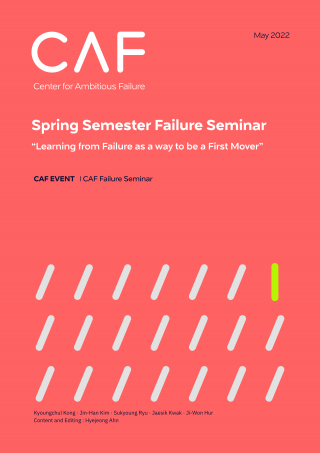 CAF Insight(Special Reports) Event Sketch - 2022 Spring Failure Seminar
CAF Insight(Special Reports) Event Sketch - 2022 Spring Failure Seminar2022-05-24
Speaker : Kyoungchul Kong · Jin-Han Kim · Sukyoung Ryu · Jaesik Kwak · Ji-Won Hur / Content and Editing : Hyejeong Ahn
On April 29th, the Center for Ambitious Failure (CAF) held its inaugural ‘Failure Seminar.’ Titled “Learning from Failure as a way to be a First Mover,” the Failure Seminar invited leaders from various fields to share their failure stories and experiences. The goal of the seminar was to give KAISTians new perspectives on failure and encourage them to be bold and adventurous in their endeavors. The following article summarizes the talks given by the five invited guest speak- ers who spoke at the first Failure Seminar. “Learning from Failure as a way to be a First Mover” Kyoungchul Kong ᅵ How do we Differentiate between Success and Failure? Jin-Han Kim ᅵ Exploring the Meaning of Failure through the Lens of Space Technology Development Sukyoung Ryu ᅵ Let a Little Sun Shine in Your Heart Jaesik Kwak ᅵ My Failures back when I was at KAIST Ji-Won Hur ᅵ The Various Forms and Meanings of Failure : the Psychology Perspective
Origin
Download -
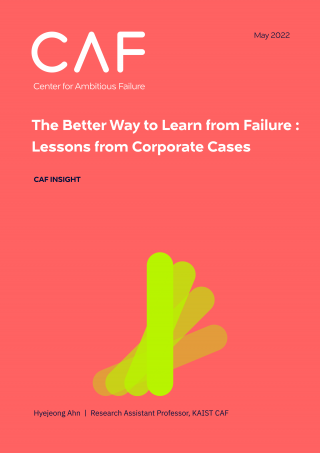 CAF InsightThe Better Way to Learn from Failure : Lessons from Corporate Cases
CAF InsightThe Better Way to Learn from Failure : Lessons from Corporate Cases2022-05-24
Hyejeong Ahn
Most people will agree that there is always something to learn from one’s failures. However, the act of deriving new insights from failure is no simple task. This is especially true for organizations – while it is difficult for an individual to come to new realizations from their failure experiences, a more complex process is involved when a group of individuals try to derive new assets from their shortcomings. Many of those in leadership positions understand the value of learning from failure, yet there are few organizations with established strategies to identify and analyze shortcomings in a detailed and effective manner. This report will discuss several key issues to consider when developing failure learning strategies for organizations based on the ideas proposed in Professor Edmondson’s report 『Strategies for Learning from Failure』 (which was published in the Harvard Business Review) as well as the views of Professor Yotaro Hatamura, the father of failure studies in Japan. The first part will dive into the spectrum of causes behind failures in companies and organizations and the character- istics of such failures under this context. The following section will provide an overview of the charac- teristics of failure data and examine various elements that organizations should consider during the process of learning from failures. Lastly, by encompassing the ideas brought forth in the previous two sections, the report will conclude by offering suggestions regarding the roles of leaders when promoting the failure learning process in an organization
Origin
Download

